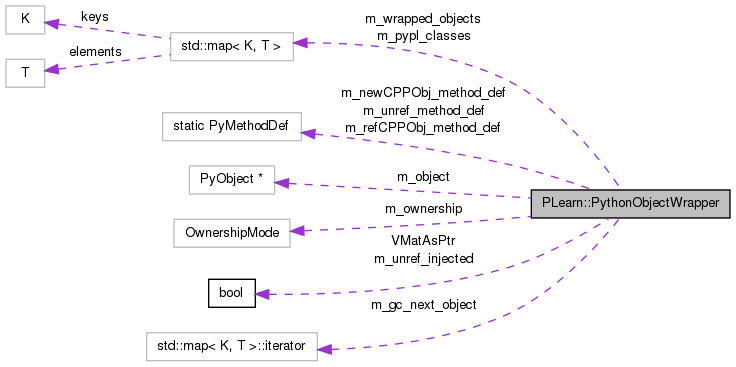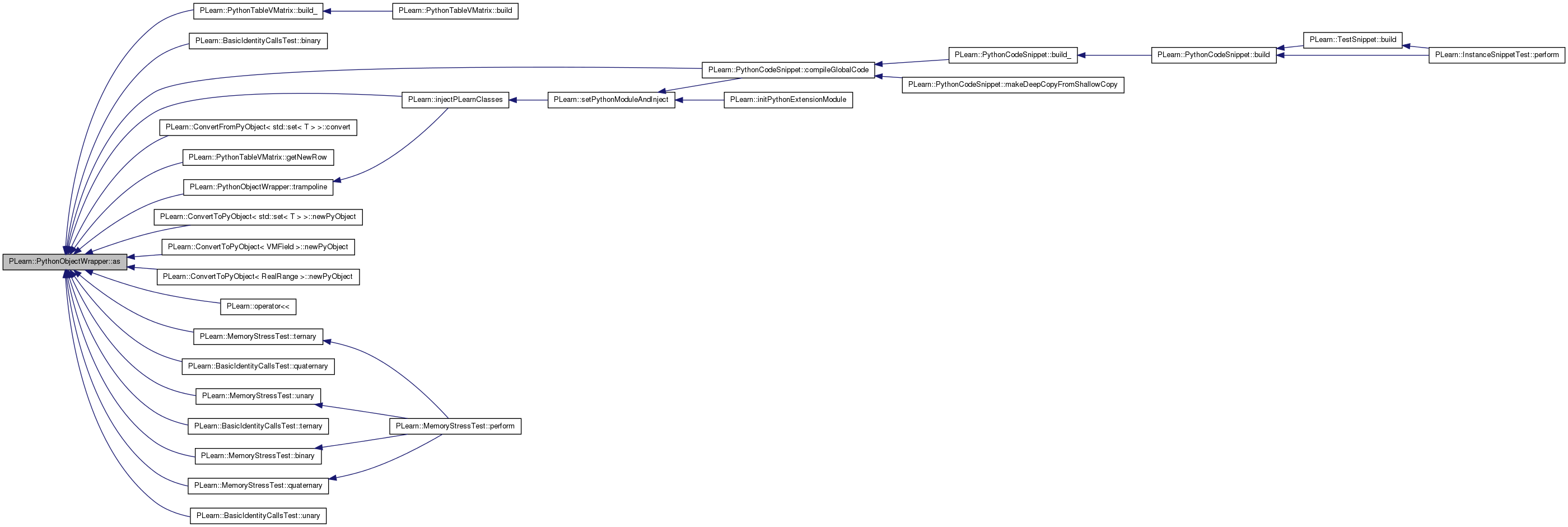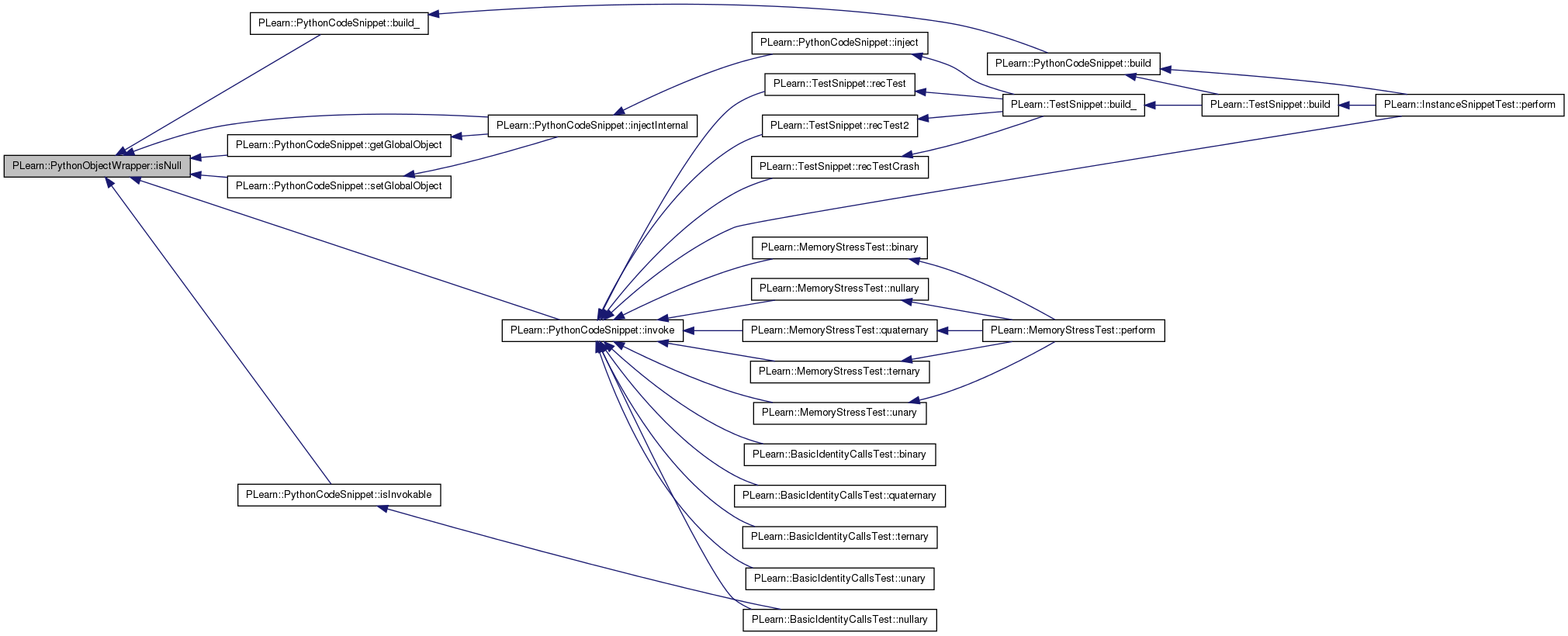|
PLearn 0.1
|
|
PLearn 0.1
|
Very lightweight wrapper over a Python Object that allows conversion to/from C++ types (including those of PLearn) More...
#include <PythonObjectWrapper.h>

Public Types | |
| enum | OwnershipMode { control_ownership, transfer_ownership } |
| Ownership mode of the PythonObject. More... | |
| typedef map< const string, PLPyClass > | pypl_classes_t |
| typedef map< const Object *, PyObject * > | wrapped_objects_t |
Public Member Functions | |
| PythonObjectWrapper (OwnershipMode o=control_ownership, bool acquire_gil=true) | |
| Construct 'None'. | |
| PythonObjectWrapper (PyObject *pyobj, OwnershipMode o=control_ownership, bool acquire_gil=true) | |
| Constructor for pre-existing PyObject. | |
| template<class T > | |
| PythonObjectWrapper (const T &x, OwnershipMode o=control_ownership, bool acquire_gil=true) | |
| Constructor for general type (forwarded to newPyObject) | |
| PythonObjectWrapper (const PythonObjectWrapper &other) | |
| Copy constructor: increment refcount if controlling ownership. | |
| ~PythonObjectWrapper () | |
| Destructor: decrement refcount if controlling ownership. | |
| PythonObjectWrapper & | operator= (const PythonObjectWrapper &rhs) |
| Assignment operator: manage refcount if necessary. | |
| template<typename T > | |
| operator T () const | |
| implicit conversion | |
| void | swap (PythonObjectWrapper &other) |
| Swap *this with another instance. | |
| PyObject * | getPyObject () const |
| Return the bare PyObject managed by the wrapper. | |
| bool | isNull () const |
| Return true if m_object is either NULL or stands for Python's None. | |
| void | printDebug () const |
| Print out the Python object to stderr for debugging purposes. | |
| template<class T > | |
| T | as () const |
| General version that relies on ConvertFromPyOBject. | |
| template<class T > | |
| T | asNoTraceback () const |
| Conversion that does not print any traceback to stderr if there is a conversion error. | |
Static Public Member Functions | |
| static PyObject * | trampoline (PyObject *self, PyObject *args) |
| static PyObject * | python_del (PyObject *self, PyObject *args) |
| static PyObject * | newCPPObj (PyObject *self, PyObject *args) |
| static PyObject * | refCPPObj (PyObject *self, PyObject *args) |
| static void | gc_collect1 () |
| static PyObject * | newPyObject () |
Create a raw PyObject* from various types. | |
| static void | initializePython () |
| This function is called by PythonCodeSnippet to carry out initializations related to libnumarray. | |
Static Public Attributes | |
| static bool | VMatAsPtr = false |
| static bool | m_unref_injected = false |
| static PyMethodDef | m_unref_method_def |
| static PyMethodDef | m_newCPPObj_method_def |
| static PyMethodDef | m_refCPPObj_method_def |
| static pypl_classes_t | m_pypl_classes |
| static wrapped_objects_t | m_wrapped_objects |
| for wrapped PLearn Objects | |
| static wrapped_objects_t::iterator | m_gc_next_object |
Protected Attributes | |
| OwnershipMode | m_ownership |
| Whether we own the PyObject or not. | |
| PyObject * | m_object |
Friends | |
| class | ConvertToPyObject |
| PStream & | operator>> (PStream &in, PythonObjectWrapper &v) |
| PStream & | operator<< (PStream &out, const PythonObjectWrapper &v) |
Very lightweight wrapper over a Python Object that allows conversion to/from C++ types (including those of PLearn)
A PythonObjectWrapper provides the ability to manage a Python Object in a fairly lightweight manner. It supports construction from a number of C++ types, which in turn create new Python objects. It also supports the conversion of the Python object back to C++ types. The PythonObjectWrapper can either own or not the Python Object. For owned objects, the Python reference count is increased with each copy or assignment, and decremented with each desctruction.
For safety reasons, the Python Global Interpreter Lock is acquired by default before constructing the Python object. However, this can be controlled by a constructor option (useful when you have already acquired the lock in a bigger context and you have to construct a large number of PythonObjectWrappers).
Definition at line 809 of file PythonObjectWrapper.h.
| typedef map<const string, PLPyClass> PLearn::PythonObjectWrapper::pypl_classes_t |
Definition at line 938 of file PythonObjectWrapper.h.
| typedef map<const Object*, PyObject*> PLearn::PythonObjectWrapper::wrapped_objects_t |
Definition at line 940 of file PythonObjectWrapper.h.
Ownership mode of the PythonObject.
If 'control_ownership', full reference counting is enabled. If 'transfer_ownership', no counting is carried out. The latter is useful when needing to transfer objects to Python functions that will become owners of the object.
Definition at line 818 of file PythonObjectWrapper.h.
| PLearn::PythonObjectWrapper::PythonObjectWrapper | ( | OwnershipMode | o = control_ownership, |
| bool | acquire_gil = true |
||
| ) |
Construct 'None'.
This object is a singleton in Python, but it must be reference-counted just like any other object.
Definition at line 439 of file PythonObjectWrapper.cc.
References control_ownership, m_object, and m_ownership.
Referenced by newCPPObj(), python_del(), refCPPObj(), and trampoline().
: m_ownership(o), m_object(Py_None) { if (m_ownership == control_ownership) {Py_XINCREF(m_object);} }

| PLearn::PythonObjectWrapper::PythonObjectWrapper | ( | PyObject * | pyobj, |
| OwnershipMode | o = control_ownership, |
||
| bool | acquire_gil = true |
||
| ) |
Constructor for pre-existing PyObject.
Definition at line 450 of file PythonObjectWrapper.cc.
References control_ownership, m_object, and m_ownership.
: m_ownership(o), m_object(pyobj) { if (m_ownership == control_ownership) {Py_XINCREF(m_object);} }
| PLearn::PythonObjectWrapper::PythonObjectWrapper | ( | const T & | x, |
| OwnershipMode | o = control_ownership, |
||
| bool | acquire_gil = true |
||
| ) | [inline, explicit] |
Constructor for general type (forwarded to newPyObject)
Definition at line 842 of file PythonObjectWrapper.h.
References m_object, and newPyObject().
: m_ownership(o) { if (acquire_gil) { PythonGlobalInterpreterLock gil; m_object = ConvertToPyObject<T>::newPyObject(x); } else m_object = ConvertToPyObject<T>::newPyObject(x); }

| PLearn::PythonObjectWrapper::PythonObjectWrapper | ( | const PythonObjectWrapper & | other | ) |
Copy constructor: increment refcount if controlling ownership.
Definition at line 463 of file PythonObjectWrapper.cc.
References control_ownership, m_object, and m_ownership.
: m_ownership(other.m_ownership), m_object(other.m_object) { if (m_ownership == control_ownership) {Py_XINCREF(m_object);} }
| PLearn::PythonObjectWrapper::~PythonObjectWrapper | ( | ) |
Destructor: decrement refcount if controlling ownership.
Always acquire the Python Global Interpreter Lock before decrementing.
Definition at line 473 of file PythonObjectWrapper.cc.
References control_ownership, m_object, and m_ownership.
{
if (m_ownership == control_ownership) {
// Hack: don't acquire the GIL if we are dealing with Py_None, since
// this object never moves in memory (no deallocation) and decrementing
// its refcount should be thread-safe. It is possible that some empty
// PythonObjectWrappers exist without build() having been called on
// them (e.g. type registration for plearn help), i.e. Py_Initialize()
// has not been called and acquiring the GIL in those cases is iffy.
if (m_object == Py_None)
Py_XDECREF(m_object);
else {
PythonGlobalInterpreterLock gil;
Py_XDECREF(m_object);
}
}
}
| T PLearn::PythonObjectWrapper::as | ( | ) | const [inline] |
General version that relies on ConvertFromPyOBject.
Definition at line 889 of file PythonObjectWrapper.h.
References m_object.
Referenced by PLearn::MemoryStressTest::binary(), PLearn::BasicIdentityCallsTest::binary(), PLearn::PythonTableVMatrix::build_(), PLearn::PythonCodeSnippet::compileGlobalCode(), PLearn::ConvertFromPyObject< std::set< T > >::convert(), PLearn::PythonTableVMatrix::getNewRow(), PLearn::injectPLearnClasses(), PLearn::ConvertToPyObject< std::set< T > >::newPyObject(), PLearn::ConvertToPyObject< VMField >::newPyObject(), PLearn::ConvertToPyObject< RealRange >::newPyObject(), PLearn::operator<<(), PLearn::MemoryStressTest::quaternary(), PLearn::BasicIdentityCallsTest::quaternary(), PLearn::MemoryStressTest::ternary(), PLearn::BasicIdentityCallsTest::ternary(), trampoline(), PLearn::MemoryStressTest::unary(), and PLearn::BasicIdentityCallsTest::unary().
{
return ConvertFromPyObject<T>::convert(m_object, true);
}

| T PLearn::PythonObjectWrapper::asNoTraceback | ( | ) | const [inline] |
Conversion that does not print any traceback to stderr if there is a conversion error.
This should be used in the rare cases where multiple return types are expected from Python and one wants to attempt several (e.g. from more specific to more general).
Definition at line 901 of file PythonObjectWrapper.h.
References m_object.
{
return ConvertFromPyObject<T>::convert(m_object, false);
}
| void PLearn::PythonObjectWrapper::gc_collect1 | ( | ) | [static] |
Definition at line 664 of file PythonObjectWrapper.cc.
References PLearn::endl(), m_gc_next_object, m_wrapped_objects, PLERROR, and PLearn::removeFromWrappedObjectsSet().
Referenced by PLearn::pythonGlobalFuncTramp(), and trampoline().
{
DBG_MODULE_LOG << "entering PythonObjectWrapper::gc_collect1()" << endl;
if(m_gc_next_object == m_wrapped_objects.end())
m_gc_next_object= m_wrapped_objects.begin();
if(m_gc_next_object != m_wrapped_objects.end())
{
wrapped_objects_t::iterator it= m_gc_next_object;
++m_gc_next_object;
if(it->first->usage() == 1 && it->second->ob_refcnt == 1)
{
//Py_DECREF(it->second);
DBG_MODULE_LOG.clearInOutMaps();
PyObject* cptr= PyObject_GetAttrString(it->second, const_cast<char*>("_cptr"));
// DBG_MODULE_LOG << "In PythonObjectWrapper::gc_collect1(), removing object "
// << PythonObjectWrapper(it->second)
// << " ; python version of: " << it->first << " (" << (void*)it->first
// << ", " << PyCObject_AsVoidPtr(cptr) << ')'
// << endl;
if(!cptr)
{
if(PyErr_Occurred()) PyErr_Print();
PLERROR("In PythonObjectWrapper::gc_collect1 : cannot get attribute '_cptr' from Python object ");
}
Py_DECREF(cptr);
removeFromWrappedObjectsSet(it->second);
gc_collect1();
}
}
DBG_MODULE_LOG << "exiting PythonObjectWrapper::gc_collect1()" << endl;
}


| PyObject* PLearn::PythonObjectWrapper::getPyObject | ( | ) | const [inline] |
Return the bare PyObject managed by the wrapper.
Definition at line 872 of file PythonObjectWrapper.h.
References m_object.
Referenced by PLearn::PythonCodeSnippet::getGlobalObject(), PLearn::PythonCodeSnippet::injectInternal(), PLearn::PythonCodeSnippet::invoke(), PLearn::PythonCodeSnippet::isInvokable(), PLearn::operator<<(), PLearn::InstanceSnippetTest::perform(), PLearn::PythonCodeSnippet::PythonCodeSnippet(), PLearn::pythonGlobalFuncTramp(), PLearn::PythonCodeSnippet::pythonTrampoline(), PLearn::PythonCodeSnippet::setGlobalObject(), and trampoline().
{
return m_object;
}

| void PLearn::PythonObjectWrapper::initializePython | ( | ) | [static] |
This function is called by PythonCodeSnippet to carry out initializations related to libnumarray.
Definition at line 81 of file PythonObjectWrapper.cc.
Referenced by PLearn::PythonCodeSnippet::build_(), PLearn::convertArrayCheck(), PLearn::initPythonExtensionModule(), PLearn::injectPLearnClasses(), and PLearn::ConvertToPyObject< Object * >::newPyObject().
{
static bool numarray_initialized = false;
if (! numarray_initialized) {
// must be in each translation unit that makes use of libnumarray;
// weird stuff related to table of function pointers that's being
// initialized into a STATIC VARIABLE of the translation unit!
import_array();//needed for PyArray_DescFromType (will segfault otherwise)
import_libnumarray();
numarray_initialized = true;
}
}

| bool PLearn::PythonObjectWrapper::isNull | ( | ) | const |
Return true if m_object is either NULL or stands for Python's None.
Definition at line 514 of file PythonObjectWrapper.cc.
References m_object.
Referenced by PLearn::PythonCodeSnippet::build_(), PLearn::PythonCodeSnippet::getGlobalObject(), PLearn::PythonCodeSnippet::injectInternal(), PLearn::PythonCodeSnippet::invoke(), PLearn::PythonCodeSnippet::isInvokable(), and PLearn::PythonCodeSnippet::setGlobalObject().

| PyObject * PLearn::PythonObjectWrapper::newCPPObj | ( | PyObject * | self, |
| PyObject * | args | ||
| ) | [static] |
Definition at line 630 of file PythonObjectWrapper.cc.
References PLearn::newObjectFromClassname(), and PythonObjectWrapper().
Referenced by PLearn::injectPLearnClasses().
{
TVec<PyObject*> args_tvec=
PythonObjectWrapper(args).as<TVec<PyObject*> >();
Object* o= newObjectFromClassname(PyString_AsString(args_tvec[1]));
//DBG_MODULE_LOG << "In PythonObjectWrapper::newCPPObj() " << PyString_AsString(args_tvec[1]) << " <-> " << (void*)o << '\t' << o << endl;
//perr << "new o->usage()= " << o->usage() << endl;
return PyCObject_FromVoidPtr(o, 0);
}


| PyObject * PLearn::PythonObjectWrapper::newPyObject | ( | ) | [static] |
Create a raw PyObject* from various types.
Return None (increments refcount)
Definition at line 701 of file PythonObjectWrapper.cc.
Referenced by PLearn::ConvertToPyObject< PP< T > >::newPyObject(), PLearn::ConvertToPyObject< std::set< T > const * >::newPyObject(), PLearn::ConvertToPyObject< std::map< T, U > const * >::newPyObject(), PLearn::ConvertToPyObject< std::vector< T > const * >::newPyObject(), PLearn::ConvertToPyObject< T * >::newPyObject(), python_del(), PythonObjectWrapper(), and refCPPObj().
{
Py_XINCREF(Py_None);
return Py_None;
}

| PLearn::PythonObjectWrapper::operator T | ( | ) | const [inline] |
| PythonObjectWrapper & PLearn::PythonObjectWrapper::operator= | ( | const PythonObjectWrapper & | rhs | ) |
Assignment operator: manage refcount if necessary.
Definition at line 492 of file PythonObjectWrapper.cc.
References swap().
{
if (&rhs != this) {
PythonObjectWrapper other(rhs);
swap(other);
}
return *this;
}

| void PLearn::PythonObjectWrapper::printDebug | ( | ) | const |
Print out the Python object to stderr for debugging purposes.
Definition at line 509 of file PythonObjectWrapper.cc.
References m_object.
{
PyObject_Print(m_object, stderr, Py_PRINT_RAW);
}
| PyObject * PLearn::PythonObjectWrapper::python_del | ( | PyObject * | self, |
| PyObject * | args | ||
| ) | [static] |
Definition at line 600 of file PythonObjectWrapper.cc.
References m_gc_next_object, m_pypl_classes, m_wrapped_objects, newPyObject(), PLERROR, and PythonObjectWrapper().
Referenced by PLearn::injectPLearnClasses().
{
TVec<PyObject*> args_tvec=
PythonObjectWrapper(args).as<TVec<PyObject*> >();
Object* obj= PythonObjectWrapper(args_tvec[0]);
string classname= obj->classname();
pypl_classes_t::iterator clit= m_pypl_classes.find(classname);
if(clit == m_pypl_classes.end())
PLERROR("in PythonObjectWrapper::python_del : "
"deleting obj. for which no python class exists!");
--clit->second.nref;
//perr << "delete " << (void*)obj << " : " << (void*)m_wrapped_objects[obj] << endl;
//perr << "bef.del o->usage()= " << obj->usage() << endl;
obj->unref();//python no longer references this obj.
//perr << "aft.del o->usage()= " << obj->usage() << endl;
//GC
if(m_gc_next_object->first == obj)
m_gc_next_object= m_wrapped_objects.end();
m_wrapped_objects.erase(obj);
//printWrappedObjects();
return newPyObject();//None
}


| PyObject * PLearn::PythonObjectWrapper::refCPPObj | ( | PyObject * | self, |
| PyObject * | args | ||
| ) | [static] |
Definition at line 642 of file PythonObjectWrapper.cc.
References PLearn::addToWrappedObjectsSet(), PLearn::TVec< T >::length(), m_wrapped_objects, newPyObject(), PythonObjectWrapper(), and PLearn::PPointable::ref().
Referenced by PLearn::injectPLearnClasses().
{
TVec<PyObject*> args_tvec=
PythonObjectWrapper(args).as<TVec<PyObject*> >();
PyObject* pyo= args_tvec[1];
Object* o= PythonObjectWrapper(pyo);
if(args_tvec.length() < 3 || args_tvec[2]==Py_True)
o->ref();
//perr << "ref o->usage()= " << o->usage() << endl;
PythonObjectWrapper::m_wrapped_objects[o]= pyo;
//checkWrappedObjects(">>>>>>>>>> in refcppobj -> checkWrappedObjects");// debug only
//perr << "refCPPObj: " << (void*)o << " : " << (void*)pyo << endl;
//DBG_MODULE_LOG << "In PythonObjectWrapper::refCPPObj() " << PythonObjectWrapper(pyo) << " <-> " << (void*)o << '\t' << o << endl;
addToWrappedObjectsSet(pyo);//Py_INCREF(pyo);
//printWrappedObjects();///***///***
return newPyObject();//None
}


| void PLearn::PythonObjectWrapper::swap | ( | PythonObjectWrapper & | other | ) |
Swap *this with another instance.
Definition at line 502 of file PythonObjectWrapper.cc.
References m_object, and m_ownership.
Referenced by operator=().
{
std::swap(this->m_ownership, other.m_ownership);
std::swap(this->m_object, other.m_object);
}

| PyObject * PLearn::PythonObjectWrapper::trampoline | ( | PyObject * | self, |
| PyObject * | args | ||
| ) | [static] |
Definition at line 521 of file PythonObjectWrapper.cc.
References as(), PLearn::RemoteTrampoline::call(), gc_collect1(), getPyObject(), i, PLearn::PLearnError::message(), PLERROR, PythonObjectWrapper(), PLearn::TVec< T >::size(), PLearn::TVec< T >::subVecSelf(), and PLearn::the_PLearn_python_exception.
Referenced by PLearn::injectPLearnClasses().
{
// DBG_MODULE_LOG << "PythonObjectWrapper::trampoline(" << PythonObjectWrapper(self)
// << ", " << PythonObjectWrapper(args) << ')' << endl;
PythonGlobalInterpreterLock gil; // For thread-safety
//get object and trampoline from self
PythonObjectWrapper s(self);
//perr << "refcnt self= " << self->ob_refcnt << endl;
RemoteTrampoline* tramp=
dynamic_cast<RemoteTrampoline*>(s.as<PPointable*>());
if(!tramp)
PLERROR("in PythonObjectWrapper::trampoline : "
"can't unwrap RemoteTrampoline.");
//wrap args
int size = PyTuple_GET_SIZE(args);
TVec<PythonObjectWrapper> args_tvec(size);
for(int i= 0; i < size; ++i)
args_tvec[i]=
PythonObjectWrapper(PyTuple_GET_ITEM(args,i));
// separate self from other params.
Object* obj= args_tvec[0];
args_tvec.subVecSelf(1, args_tvec.size()-1);
//perr << "REMOTE METHOD: " << obj->classname() << "::" << tramp->documentation().name() << endl;
gc_collect1();
//call, catch and send any errors to python
try
{
PythonObjectWrapper returned_value= tramp->call(obj, args_tvec);
PyObject* to_return= returned_value.getPyObject();
Py_XINCREF(to_return);
return to_return;
}
catch(const PLearnError& e)
{
PyErr_SetString(the_PLearn_python_exception, e.message().c_str());
return 0;
}
catch(const std::exception& e)
{
PyErr_SetString(PyExc_Exception, e.what());
return 0;
}
catch(...)
{
PyErr_SetString(PyExc_Exception,
"Caught unknown C++ exception while executing injected function "
"inside a PythonObjectWrapper");
return 0;
}
}


friend class ConvertToPyObject [friend] |
Definition at line 948 of file PythonObjectWrapper.h.
| PStream& operator<< | ( | PStream & | out, |
| const PythonObjectWrapper & | v | ||
| ) | [friend] |
Definition at line 1015 of file PythonObjectWrapper.cc.
{
out << v.getPyObject();
return out;
PLERROR("operator<<(PStream&, const PythonObjectWrapper&) : "
"not supported (yet).");
/*
PyObject* env= PyDict_New();
if(0 != PyDict_SetItemString(env, "__builtins__", PyEval_GetBuiltins()))
PLERROR("in operator<<(PStream&, const PythonObjectWrapper& v) : "
"cannot insert builtins in env.");
if(0 != PyDict_SetItemString(env, "the_obj", v.m_object))
PLERROR("in operator<<(PStream&, const PythonObjectWrapper& v) : "
"cannot insert the_obj in env.");
PyObject* res= PyRun_String("\nfrom cPickle import *\nresult= dumps(the_obj)\n",
Py_file_input, env, env);
if(!res)
{
Py_DECREF(env);
if(PyErr_Occurred()) PyErr_Print();
PLERROR("in operator<<(PStream&, const PythonObjectWrapper& v) : "
"cannot pickle python object.");
}
Py_DECREF(res);
string pickle=
PythonObjectWrapper(env).as<std::map<string, PythonObjectWrapper> >()["result"];
Py_DECREF(env);
string toout= string("PythonObjectWrapper(ownership=") + tostring(v.m_ownership) + ", object=\"" + pickle + "\")";
out << toout;
*/
return out; // shut up compiler
}
| PStream& operator>> | ( | PStream & | in, |
| PythonObjectWrapper & | v | ||
| ) | [friend] |
Definition at line 963 of file PythonObjectWrapper.cc.
{
PLERROR("operator>>(PStream&, PythonObjectWrapper&) : "
"not supported (yet).");
/*
string s;
in >> s;
string sub= "PythonObjectWrapper(ownership=";
if(s.substr(0,sub.length()) != sub)
PLERROR("in operator>>(PStream& in, PythonObjectWrapper& v) : "
"expected '%s' but got '%s'.",
sub.c_str(), s.c_str());
s= s.substr(sub.length());
v.m_ownership= static_cast<PythonObjectWrapper::OwnershipMode>(s[0]-'0');
s= s.substr(1);
sub= ", object=";
if(s.substr(0,sub.length()) != sub)
PLERROR("in operator>>(PStream& in, PythonObjectWrapper& v) : "
"expected '%s' but got '%s'.",
sub.c_str(), s.c_str());
s= s.substr(sub.length());
PStream sin= openString(s, PStream::plearn_ascii, "r");
string pickle;
sin >> pickle;
PyObject* pypickle= PyString_FromString(pickle.c_str());
PyObject* env= PyDict_New();
if(0 != PyDict_SetItemString(env, "__builtins__", PyEval_GetBuiltins()))
PLERROR("in operator>>(PStream&, PythonObjectWrapper& v) : "
"cannot insert builtins in env.");
if(0 != PyDict_SetItemString(env, "the_pickle", pypickle))
PLERROR("in operator>>(PStream&, PythonObjectWrapper& v) : "
"cannot insert the_pickle in env.");
Py_DECREF(pypickle);
PyObject* res= PyRun_String("\nfrom cPickle import *\nresult= loads(the_pickle)\n",
Py_file_input, env, env);
if(!res)
{
Py_DECREF(env);
if(PyErr_Occurred()) PyErr_Print();
PLERROR("in operator<<(PStream&, const PythonObjectWrapper& v) : "
"cannot unpickle python object '%s'.",pickle.c_str());
}
Py_DECREF(res);
v.m_object=
PythonObjectWrapper(env).as<std::map<string, PyObject*> >()["result"];
Py_INCREF(v.m_object);
Py_DECREF(env);
*/
return in;
}
PythonObjectWrapper::wrapped_objects_t::iterator PLearn::PythonObjectWrapper::m_gc_next_object [static] |
Definition at line 942 of file PythonObjectWrapper.h.
Referenced by gc_collect1(), and python_del().
PyMethodDef PLearn::PythonObjectWrapper::m_newCPPObj_method_def [static] |
Definition at line 936 of file PythonObjectWrapper.h.
Referenced by PLearn::injectPLearnClasses().
PyObject* PLearn::PythonObjectWrapper::m_object [protected] |
Definition at line 946 of file PythonObjectWrapper.h.
Referenced by as(), asNoTraceback(), getPyObject(), isNull(), PLearn::ConvertToPyObject< PythonObjectWrapper >::newPyObject(), printDebug(), PythonObjectWrapper(), swap(), and ~PythonObjectWrapper().
Whether we own the PyObject or not.
Definition at line 945 of file PythonObjectWrapper.h.
Referenced by PythonObjectWrapper(), swap(), and ~PythonObjectWrapper().
Definition at line 939 of file PythonObjectWrapper.h.
Referenced by PLearn::injectPLearnClasses(), PLearn::ConvertToPyObject< Object * >::newPyObject(), and python_del().
PyMethodDef PLearn::PythonObjectWrapper::m_refCPPObj_method_def [static] |
Definition at line 937 of file PythonObjectWrapper.h.
Referenced by PLearn::injectPLearnClasses().
bool PLearn::PythonObjectWrapper::m_unref_injected = false [static] |
Definition at line 934 of file PythonObjectWrapper.h.
PyMethodDef PLearn::PythonObjectWrapper::m_unref_method_def [static] |
Definition at line 935 of file PythonObjectWrapper.h.
Referenced by PLearn::injectPLearnClasses().
for wrapped PLearn Objects
Definition at line 941 of file PythonObjectWrapper.h.
Referenced by PLearn::checkWrappedObjects(), gc_collect1(), PLearn::ConvertToPyObject< Object * >::newPyObject(), PLearn::printWrappedObjects(), python_del(), PLearn::ramassePoubelles(), and refCPPObj().
bool PLearn::PythonObjectWrapper::VMatAsPtr = false [static] |
Definition at line 823 of file PythonObjectWrapper.h.
Referenced by PLearn::getVMatAsPtr(), main(), PLearn::ConvertToPyObject< PP< VMatrix > >::newPyObject(), and PLearn::setVMatAsPtr().
 1.7.4
1.7.4